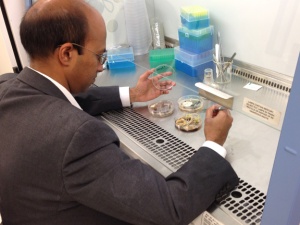Ogden News
WKU-Owensboro researcher testing basil as cancer treatment
- Friday, January 17th, 2014
Plants that may help fight breast cancer are sprouting and taking root in a WKU biology faculty member’s laboratory at the Owensboro Centre for Business and Research.
Dr. Chandra Emani, assistant professor of plant molecular biology at WKU-Owensboro, is conducting research on the pharmaceutical and therapeutic benefits of the basil plant (ocimum sp.), the herb widely known for its medicinal and culinary uses.

Dr. Chandra Emani, assistant professor of plant molecular biology at WKU-Owensboro, is conducting research on the pharmaceutical and therapeutic benefits of the basil plant.
“If you look at the east, they’ve been using the plant not exactly as a medication but a supplement for a lot of treatments,” he said. “Basil is a plant which has a lot of compounds called metabolites, meaning the leaves of a basic basil plant, like any other plant, make a lot of stuff.”
In his lab at the Owensboro facility, Dr. Emani and his students are genetically engineering the basil to produce more eugenol, a compound in basil that “has a very great pharmaceutical value because it’s shown to control breast cancer.”
“When you grind these basil leaves there is a compound called eugenol that comes out,” said Dr. Emani, who received a $12,000 Research and Creative Activities Program (RCAP) grant from WKU’s Office of Research. “Eugenol, when they put it on a plate where there are tumor cells, it stopped growth of the tumor cells. That was a proof of concept experiment which was done a long time back.”
Through his research at the Owensboro center, Dr. Emani is continuing to build the proof of concept that basil could produce a useful plant-based pharmaceutical to treat breast cancer.
“If I make it make higher and higher amounts of eugenol, that plant, basil plant, will be a storehouse of that anti-cancerous compound,” he said.
The next phase in the research project would be to test the compound as an effective cancer treatment. “If I can show it stops breast cancer growth, I have now an environmentally friendly plant-based treatment for breast cancer,” Dr. Emani said.
With those results, Dr. Emani would then be able to seek funding from other research agencies for clinical trials “to see if this is an effective way to get a pharmaceutical compound from a plant.”
Dr. Emani’s project aims at complementing the efforts of groups in the Owensboro cancer research program that are utilizing plant-based pharmaceuticals in cancer treatment.
“Plants are a storehouse of chemicals which can treat anything that’s inflamed,” he said. “Inflammation is the basis for cancer so if we can find plant based treatment it may not be painful medical process anymore. It’s just we have this plant we can include in the diet at the very early stages and ward off inflammation that would otherwise lead to cancer.”
In addition to combatting cancer and improving the community’s health, the research project is increasing the undergraduate research opportunities offered through WKU-Owensboro, Dr. Emani said.
Dr. Emani, who earned his bachelor’s, master’s and doctoral degrees in India, has been at WKU-Owensboro since 2010 and has seen the number of students taking his courses and working in the research lab grow from two to 15.
By taking advantage of WKU’s FUSE (Faculty-Undergraduate Student Engagement) grants, his students are becoming full-fledged researchers and preparing themselves for graduate schools. And by working in his lab and with partners like Hollison Technologies and Kentucky BioProcessing, his students are gaining real-world experience in plant-based genetic engineering.
“We want to deal with treating cancer in a very holistic way, what I mean is we want to find one treatment that takes care of many cancers,” he said.
Some of the links on this page may require additional software to view.


